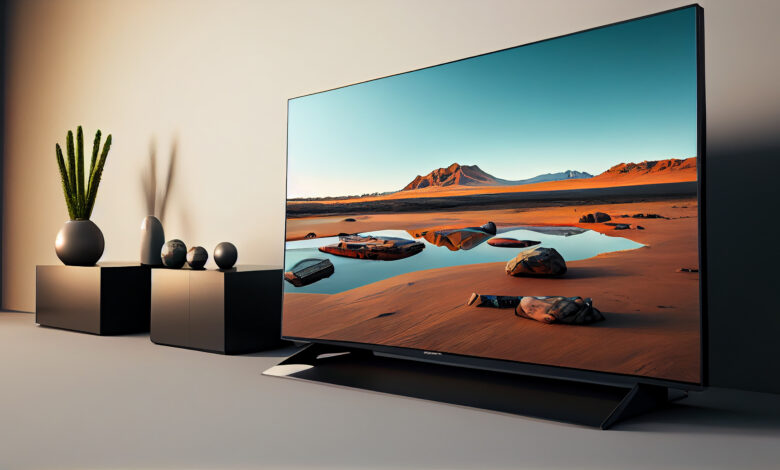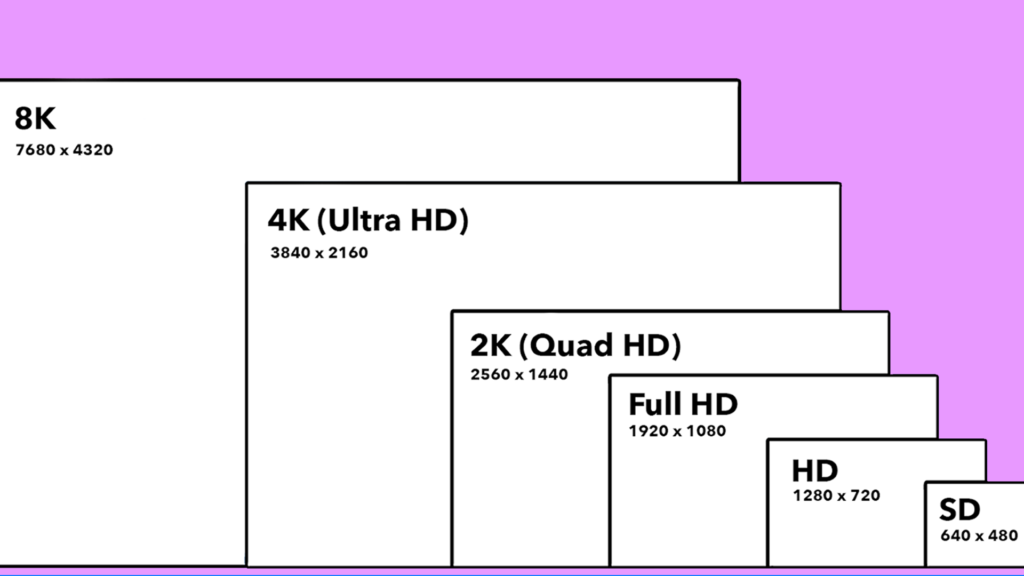
Difference Between 4K vs 1080p
Introduction
Difference between 4K vs 1080p In today’s world of advanced technology, understanding the difference between 4K TV and 1080p is essential for anyone looking to upgrade their viewing experience. This guide will explore the distinctions between these resolutions, including Ultra HD (UHD), HDR performance, and more, to help you make an informed decision.
Difference Between 4K vs 1080p
Difference Between 4K vs 1080p The most significant difference between 4K vs 1080p is the resolution. A 1080p TV has a resolution of 1920×1080 pixels, while a 4K TV offers a resolution of 3840×2160 pixels. This results in four times the number of pixels, providing a much clearer and sharper image, especially on larger screens.

Ultra HD Monitor
Ultra HD (UHD) monitors have become increasingly popular, particularly for gaming and professional work. UHD provides a resolution that greatly enhances detail and clarity, making it an ideal choice for those who demand the best visual performance.
What Do 4K vs 1080p Mean?
Difference Between 4K vs 1080p refer to the resolution of a display. “4K” typically means a resolution of 3840×2160 pixels, offering four times the resolution of 1080p, which stands for 1920×1080 pixels. This higher resolution translates to more detailed and immersive content, especially as 4K content becomes more widely available.
What’s the Difference Between 4K vs 1080p in Detail?
- Resolution: 4K offers a significantly higher resolution than 1080p.
- Content Availability: While 1080p content is still prevalent, 4K content is rapidly growing in availability.
- Price: 4K TVs and monitors generally cost more than their 1080p counterparts.
- HDR: High Dynamic Range (HDR) is more commonly found in 4K TVs, enhancing the viewing experience with better contrast and color accuracy.
Understanding the detailed differences between 4K vs 1080p
Difference Between 4K vs 1080p is essential when choosing the right display for your needs. Below is a table that outlines the key differences between these two resolutions:
| Resolution | Vertical Pixels | Horizontal Pixels | Total Pixels | Marketing Names |
|---|---|---|---|---|
| 4K | 2160 | 3840 | 8 million+ | Ultra High Definition, Ultra HD, UHD |
| 1080p | 1080 | 1920 | 2 million+ | Full High Definition, Full HD, FHD |
As you can see, 4K resolution offers significantly more pixels, which translates to a sharper and more detailed image, especially noticeable on larger screens. In contrast, 1080p, while still offering excellent quality, provides fewer pixels, making it more suitable for smaller displays or general use.

| Resolution Type | Pixel Dimensions | Pixel Count |
|---|---|---|
| 1080p (Full HD) | 1920×1080 | 2.07 million |
| 4K (Ultra HD) | 3840×2160 | 8.29 million |
HDR
HDR, or High Dynamic Range, is a feature that improves the contrast and color accuracy of your TV. It is most effective on 4K TVs and brings out the finest details in both the brightest and darkest areas of a scene, offering a more lifelike and immersive viewing experience.

Viewing Distance
The human eye has limitations on its range of perception, and sitting too far away from your television can prevent you from seeing all the finer details in the image.
If you sit too far from a 4K television, the picture may resemble what you would see on a lower-resolution screen. However, if you sit close to a large-screen TV, you will be able to discern a noticeable difference. It’s important to note that even if you move further away, you may still notice a difference, but it may not be as pronounced. While 4K resolution may not offer significant advantages beyond a certain distance, the quality will be significantly higher if viewed up close.
Is There a Noticeable Difference in Quality Between 4K and 1080p on Smaller Screens?
On smaller screens, the difference between 4K and 1080p may not be as noticeable. The benefits of 4K are more apparent on larger displays, where the increased pixel density greatly enhances image clarity.
4K and 1080p: Which One Is Better?
Choosing between 4K and 1080p depends on your needs and preferences. If you prioritize the highest possible image quality and are willing to invest in a premium device, 4K is the superior option. However, for general viewing purposes, 1080p still delivers excellent quality at a more accessible price point.
HDR Performance
HDR performance is another area where 4K TVs excel. With the ability to display a broader range of colors and contrasts, 4K TVs with HDR support provide a superior viewing experience, particularly for movies and video games.
Best Choices for HD Conference Camera
When selecting an HD conference camera, resolution is key. A 4K camera ensures that every detail is captured during video conferences, but a 1080p camera can still provide high-quality video at a lower cost, making it a viable option for many users.
The Best Webcam for 4K & 1080p Video Recording
When it comes to choosing the best webcam for video recording, the choice between 4K and 1080p will depend on your specific needs. A 4K webcam offers unparalleled clarity, ideal for professional content creators, while a 1080p webcam provides excellent quality for everyday use.
8K vs 4K vs 1080p: Which Is the Best?

When choosing the best TV, resolution is a critical factor, with more pixels generally leading to a higher resolution and better picture quality. However, resolution isn’t the only consideration. It’s important to look at other aspects like the latest features, design, and sound quality to find the perfect TV that fits your lifestyle. By combining these factors, you’ll enjoy a truly immersive viewing experience. For more guidance, check out our Samsung TV Buying Guide to help you select the ideal TV for your needs.
Here’s the rewritten content with the heading adjusted:
What Is the Best 8K TV?
There are several impressive 8K HDR Smart TVs available, ranging from 65 inches to a massive 98 inches. Among them, the 85” QN900A Neo QLED 8K HDR Smart TV stands out as the ultimate choice for a home cinema experience. It features cutting-edge technology like the Infinity Screen, which offers edge-to-edge, uninterrupted viewing. Additionally, the Object Tracking Sound PRO system immerses you in the action by delivering sound that follows the movement on screen, thanks to the ten strategically placed speakers.
All 8K TVs from this lineup come equipped with the Neo Quantum Processor 8K, which enhances everything you watch by optimizing brightness, sharpness, and contrast. Samsung’s anti-glare screens further elevate the viewing experience, absorbing reflections to maintain stunning color and contrast from any angle. Whether you’re watching a midday match or a midnight movie, these 8K TVs ensure an incredible viewing experience, no matter where you’re sitting. Explore the full range of 8K TVs to find the one that best matches your needs.






